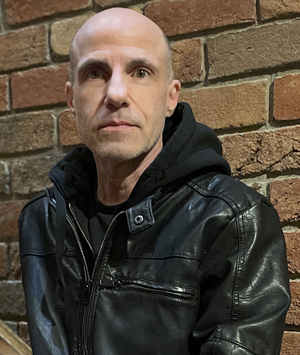
A Wolf in Sleep’s Clothing
Contributor’s Marginalia: Frank Paino responding to Lynne Knight’s “The Hour of the Wolf”
Any successful palindrome employs the line’s flat horizon to move us in a circle, so that, in Eliot’s famous words, we “arrive where we started / and know that place for the first time.”
With its incantatory rhythm and insistent rhyme, Lynne Knight’s, “The Hour of the Wolf,” brilliantly accomplishes this task, singing its spell so deftly I didn’t even know I’d been bewitched until a few moments after the echoes of that last line faded from my mind and lips (yes, I do read poems I admire aloud and highly recommend you do the same).
When invited to respond to this piece, I read the poem three times. Slowly. Each pass pulling me deeper into its trance. Thus lulled, I followed where it led…
________
The grandfather clock’s hands slow-walk its starry face.
Now comes the hour of the wolf. That hinterland in the middle of night’s nowhere. A stitch pulled from the seam of yesterday and tomorrow.
Weary, yet unable to sleep, defenses quite literally lowered by the ebb of easeful hormones—serotonin (elevates mood) and cortisol (controls stress)—I’m haunted by thoughts too terrible to be given voice.
What if? What if? The clock gears insist.
Mea culpa. Mea culpa for each trespass whose memory surfaces like some final exhalation loosed in deep fathoms.
Sometimes, my only defense is a book grasped like a talisman against dread, words a-jumble, cyclonic and senseless, but mildly effective against the menace of shadows slouched in that corner of the room where sodium light falls short of its bright commission.
The grandfather clock’s hands slow-walk its starry face.
My closet door. Ajar.
Inside, the suit I meant to wear to my father’s funeral Mass… though, truth be told, there is no suit, only a gap between hangers, slim as my resolve to attend that litany of bland platitudes.
No suit. Not really. But I see it, anyway. Hanging like a half-cocked scarecrow… no head, no hands or feet, the meat of the thing plumped, not with straw, but with the rags of all I’ve done and all I’ve failed to do.
Oh, road to hell.
Oh, good intentions.
I can see the nuns who taught the child-me shaking their veiled heads in disapproval. Hear the priest’s ring strike wood as the door behind the confessional curtain slides open. I picture him leaning in, ear pressed to the dark as he listens for what I will never tell.
What if? What if? The clock gears insist.
My closet door. Ajar.
Across the lane, horses kick at the stable’s fragrant sideboards, gnaw the stall gates, anxious, in the predawn black, for the sound of the rancher’s boots drawing closer. Warm scent of hay flaring velvet nostrils.
Here in this room, my old mutt marks the time with her primal routine—circle upon circle—paws tamping the comforter into sleep’s soft blueprint before she settles at the foot of my bed, takes one long breath that sounds resigned, as if she keeps some dreadful watch. Almost as if she lays upon my grave.
The grandfather clock’s hands slow-walk its starry face.
